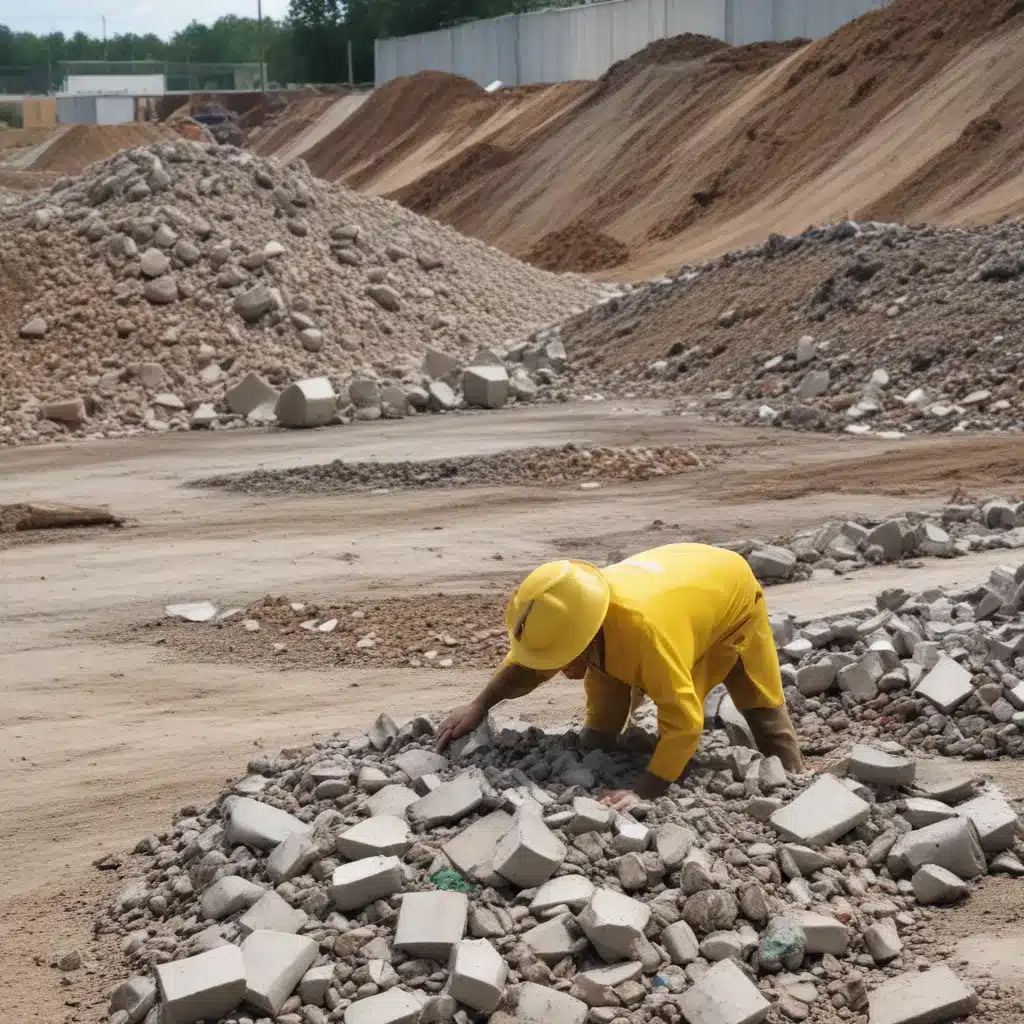
The Increasing Need for Sustainable Construction Materials
As populations grow and consumption patterns evolve, the disposal of municipal solid waste (MSW) has become a pressing global issue with significant environmental and economic impacts. One promising solution to this challenge is the utilization of MSW as sustainable construction materials. By incorporating waste into building products, not only can the volume of waste sent to landfills be reduced, but the demand for natural resources can also be diminished, contributing to a more circular economy.
Harnessing the Potential of MSW in Construction
Researchers and practitioners have been increasingly exploring the use of various MSW-derived materials in the production of sustainable construction products. This comprehensive review delves into the diverse applications of MSW in the manufacturing of fired clay bricks, eco-cement, geopolymers, ceramic bricks, fly ash (FA), bottom ash (BA), incineration fly ash (IFA), incineration bottom ash (IBA), and coal bottom ash (CBA).
Fired Clay Bricks
MSWI (municipal solid waste incineration) residues can be used as key ingredients in the fabrication of fired clay bricks. These residues are blended with degraded MSW and fired at high temperatures, resulting in bricks with improved physical and mechanical properties compared to traditional clay bricks. The incorporation of FA and BA wastes from MSWI has also been found to enhance the performance of eco-friendly clay bricks.
Eco-Cement
The production of eco-cement, a type of cement derived from MSWI residues, has emerged as a sustainable alternative to traditional Portland cement. Studies have shown that eco-cement is not inferior to conventional cement in terms of quality and strength development. Additionally, IBA can be utilized as a supplementary cementitious material, further contributing to the circularity of MSW-based construction solutions.
Geopolymers
Rice husk ash, coal fly ash, and municipal solid incineration ash have been successfully employed in the fabrication of geopolymer binders, which can serve as green construction materials. These waste-derived binders offer an environmentally friendly alternative to traditional cement-based products.
Ceramic Bricks and Wall Blocks
MSWI fly ash has been utilized in the production of ceramic bricks and modified wall blocks, demonstrating their potential as eco-friendly construction materials. The incorporation of MSWI fly ash can help mitigate the environmental pollution associated with its disposal, while also contributing to the development of sustainable building solutions.
Ash-Based Concrete Aggregates
MSWI bottom ash, similar to coal bottom ash (CBA), can be used as a supplementary fine aggregate in concrete mixes. These waste-derived aggregates possess good silica content and pozzolanic properties, making them suitable for use in sustainable concrete production.
Innovative Applications of MSW in Construction
The utilization of MSW-derived materials extends beyond traditional construction products. Researchers have also explored the use of plastic bottles, rubber tires, and rice husk-plastic composites in various construction applications.
Plastic Waste in Bituminous Mixes and Concrete
MSW plastic bottles and rubber tires can be employed as partial replacements in bituminous concrete mixes, contributing to meeting the growing demand for bitumen in road construction. Additionally, the incorporation of waste plastics in concrete mixes has been found to enhance ductility, workability, and durability, while also reducing density.
Rice Husk-Plastic Composites
Rice husk-plastics composites have shown promise as sustainable materials for roofing, concrete placement, and interior wall panels due to their favorable flexural strength, dimensional stability, and water resistance.
Waste-Derived Aggregates in Autoclaved Aerated Concrete (AAC)
The utilization of MSW-derived materials, such as MSWI bottom ash and wood fibers, has been explored in the production of autoclaved aerated concrete (AAC). These waste-based aggregates can improve the thermal and mechanical properties of AAC, contributing to the development of energy-efficient building materials.
Towards a Circular Economy in Construction
The integration of MSW-derived materials in sustainable construction solutions not only addresses the challenges of waste management but also contributes to the preservation of natural resources. By transforming waste into valuable building products, the construction industry can move towards a more circular and environmentally responsible model.
The studies reviewed in this article highlight the significant potential of MSW utilization in improving the performance, durability, and environmental impact of various construction materials. As the research in this field continues to evolve, it is crucial to develop robust standards and regulations to ensure the widespread adoption of these waste-based construction solutions.
To learn more about the innovative use of municipal solid waste in sustainable construction, visit https://woodstoveheaters.com/, where our team of experts provides practical tips and in-depth insights on the latest advancements in the field.
Conclusion
The utilization of municipal solid waste (MSW) in sustainable construction materials is a promising approach to address the growing challenges of waste management and resource depletion. This comprehensive review has explored the diverse applications of MSW-derived materials in the production of fired clay bricks, eco-cement, geopolymers, ceramic bricks, and concrete aggregates.
The integration of waste-based materials in construction not only reduces the volume of waste sent to landfills but also contributes to the conservation of natural resources, leading to a more circular and environmentally responsible industry. The studies reviewed in this article have demonstrated the potential of MSW-derived materials to enhance the performance, durability, and sustainability of various construction products.
As the research in this field continues to evolve, it is essential to develop robust standards and regulations to ensure the widespread adoption of these waste-based construction solutions. By harnessing the potential of MSW, the construction industry can play a pivotal role in transitioning towards a more sustainable future.
To stay informed about the latest advancements in the utilization of municipal solid waste in sustainable construction, visit https://woodstoveheaters.com/, where our team of experts provides practical tips and in-depth insights on the subject.


